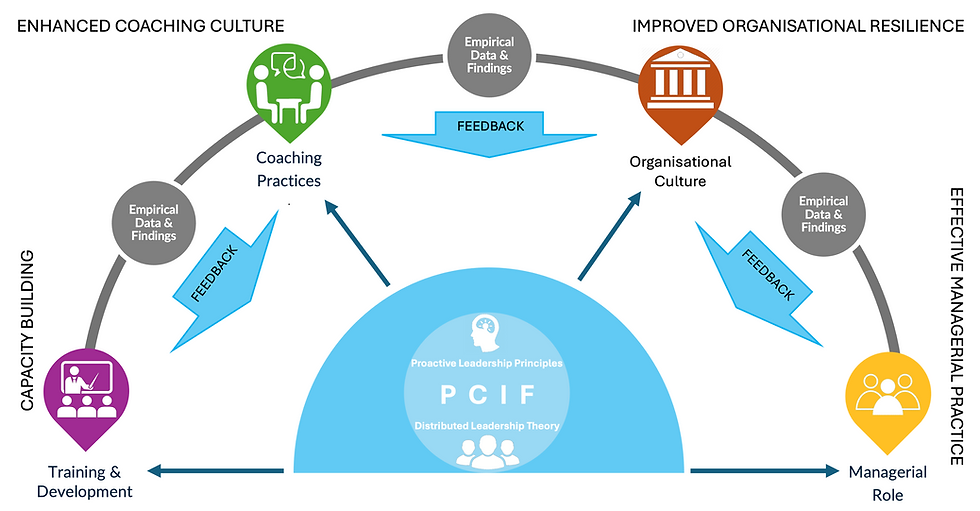Unveiling the Proactive Coaching Integration Framework: A New Standard for Coaching Excellence
- peterchum

- May 28, 2025
- 3 min read
In the ever-evolving landscape of organisational development, the need for a transformative approach to coaching has never been more pressing. Between 2020 and 2024, through the rigorous pursuit of my doctoral research, I crafted the Proactive Coaching Integration Framework (PCIF), a pioneering standard designed to redefine how coaching fosters personal and organisational growth. Emerging from an in-depth exploration of coaching and organisational dynamics, the PCIF is not a collection of tools or a rigid roadmap but a universal principle that champions coachee-driven progress. This framework, born from academic inquiry, stands as a beacon for those seeking to align individual aspirations with collective goals, offering a fresh perspective on what coaching can achieve.
The genesis of the PCIF lies in a profound recognition: traditional coaching models often fall short when they rely on prescriptive methodologies that fail to account for the diverse contexts in which individuals and organisations operate. My research sought to address this gap by developing a standard that transcends such limitations. Rather than dictating how coaching should occur, the PCIF establishes a principle of empowerment, encouraging coachees to take ownership of the benefits that coaching can yield—higher retention rates, stronger psychological contracts with their organisations, and heightened productivity. This standard, developed independently of my later works, is rooted in the belief that when coachees perceive organisational gains as their own, they are inspired to give their very best, creating a ripple effect of progress that transforms workplaces.
At the heart of the PCIF lies a philosophy that celebrates the potential of every individual, regardless of their circumstances. It posits that coachees who internalise the benefits of coaching align their personal ambitions with organisational objectives, igniting a powerful motivation to excel. This principle is inherently adaptive, recognising that each coachee’s context—whether they operate in a resource-rich multinational or a lean startup—shapes what ‘their best’ looks like. For instance, a manager in a well-funded firm might devise expansive strategies, while one in a resource-constrained setting might focus on incremental improvements. Yet, both embody the PCIF by striving to create outcomes that surpass the present, fostering a future that is always better than today. By rejecting prescriptive tools, the PCIF cultivates a mindset of continuous improvement, where the act of striving becomes the catalyst for transformation.
The impact of the PCIF on the coaching community is profound, as it introduces a universal standard that reimagines the role of coaching. It empowers coachees to take the lead in their development, fostering a sense of ownership that deepens their engagement with the coaching process. Coaches, in turn, are encouraged to shift from directing to supporting, guiding coachees to unlock their potential in ways that resonate with their unique circumstances. This flexibility allows the PCIF to be applied creatively across diverse contexts, from one-on-one sessions to large-scale organisational initiatives. By prioritizing coachee aspiration over rigid processes, the PCIF challenges the coaching community to embrace a paradigm where the focus is on inspiring progress rather than enforcing methodologies. This shift not only elevates coaching practice but also strengthens its relevance in an increasingly dynamic professional landscape.
For businesses striving to cultivate a coaching culture, the PCIF offers a transformative vision. It inspires leaders to see their personal growth as intertwined with organisational success, fostering a leadership style that is both engaged and forward-thinking. When coachees—whether employees or managers—view benefits like improved productivity as personal gains, they become a motivated workforce, driving performance and innovation. The PCIF’s context-agnostic nature ensures that progress is possible even in the face of limitations, as it hinges on the commitment to do one’s best rather than on external resources. This commitment fuels continuous improvement, embedding a culture of resilience and aspiration within organisations. As businesses adopt the PCIF, they move away from hierarchical models towards collaborative environments where every individual is empowered to contribute to a better future.
In conclusion, the Proactive Coaching Integration Framework, developed through my doctoral research from 2020 to 2024, represents a bold step forward in the field of coaching. By empowering coaching managers and coachees to embrace organisational benefits as their own, the PCIF ignites a passion for excellence that drives unparalleled effort. This standard, free from the constraints of prescriptive tools, reshapes coaching and organisational cultures, paving the way for a future where personal and collective progress are inextricably linked. As the PCIF takes root, it promises to inspire a new era of coaching that is as aspirational as it is transformative, inviting all who engage with it to strive for a better tomorrow.





Comments